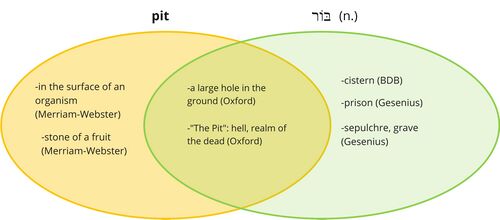Template:ExegeticalNotes/ResultsFormat
From Psalms: Layer by Layer
This template displays Exegetical Notes via transclusion so as to avoid all issues of <ref>...</ref> as well as images. Use it as a results template in a query.
{{#ask:
[[IsCategory::Exegetical Note]]
[[Chapter::92]]
[[MinVerseInteger::9]]
[[Layer::Grammar]]
| ? Summary
| ? VerseRange
| ? Text
| format=template
| template=ExegeticalNotes/ResultsFormat
| mainlabel=PageName
| namedargs=yes
| link=none
| sort=MinVerse
| limit = 1
}}
List
- Verbs of perception in qatal often have present tense stative value. Modern translations all render נֶחְשַׁבְתִּי as a present state.
- The attributive participle יוֹרְדֵי is not marked in terms of tense or aspect, and since the context is not decisive enough here, there are various options. Tate (1990:396) suggests an attractive reading of the participle as an imminent future ('those about to go to the Pit'). Nevertheless we take the consensual choice among Modern Translations to read that participle as a present gnomic one. This is further backed by the Greek and Latin present participle καταβαινόντων and descendentibus.
- The verb הָיָה is either stative ('to be') or dynamic-inchoative ('to become'). A qatal present stative is rare (cf. JM §111i, Gen 42:31), therfore we choose the inchoative reading, supported by Goldingay:2007; Dahood:1974. Cf. also Gen 3:22.
- v. 5b The relative clause here is asyndetic, with the retrospective pronoun לוֹ being omitted, common in poetry (JM §158c).
- v. 5a: בּוֹר
- Many translations take בור literally as pit, translating the phrase as "those who go down to the pit" (NIV,ESV), some capitalize the word "those who go down to the Pit" (ISV), and some understand it metaphorically as "those who go down to the grave" (NET). Here the explicit translation is preferred.

- v. 5: The meaning of אֱיָל
- The noun אֱיָל is a hapax legomenonThat is, the term only occurs once in Biblical Hebrew. in the Bible. It is derived of the root אול with the primary polysemous meanings of "to be in front"/"to be strong"; comp. אֵל "god"; Arb. ʾawwal "first" (HALOT). BDB takes this noun as a loan-word from Aramaic with the meaning "help" (comp. Syr. ʾiyālā "help"). Also noteworthy is the derived noun אֱיָלוּת (Ps 22:20), also a hapax legomenon, which in the context of its psalm probably means "help". The noun אֱיָל is read as such in LXX (ἄνθρωπος ἀβοήθητος "a helpless man") and Peshitta (see ʾiyālā above). On the other hand, The Vulgate iuxta Hebr. has invalidus ("impotent") so as Targum which has בר נש דלית ליה חילא ("a man who has no strength").
- We prefer to follow Tate 1990, 396 who, like the Vulgate and Targum, reads אֱיָל as "strength". This reading, etymologically justified (see above), fits in better with the direct context: the noun גֶּבֶר (in contrast to אִישׁ) is often marked in terms of qualities of manhood such as courage and strength (see Venn Diagram below). The reading of אֱיָל as strength is backed by most modern translations (NIV, NLT, ESV, NKJV et alia).
- v. 5: גֶּבֶר
With summary
Verbal Notes
- Verbs of perception in qatal often have present tense stative value. Modern translations all render נֶחְשַׁבְתִּי as a present state.
- The attributive participle יוֹרְדֵי is not marked in terms of tense or aspect, and since the context is not decisive enough here, there are various options. Tate (1990:396) suggests an attractive reading of the participle as an imminent future ('those about to go to the Pit'). Nevertheless we take the consensual choice among Modern Translations to read that participle as a present gnomic one. This is further backed by the Greek and Latin present participle καταβαινόντων and descendentibus.
- The verb הָיָה is either stative ('to be') or dynamic-inchoative ('to become'). A qatal present stative is rare (cf. JM §111i, Gen 42:31), therfore we choose the inchoative reading, supported by Goldingay:2007; Dahood:1974. Cf. also Gen 3:22.
Grammar Notes
- v. 5b The relative clause here is asyndetic, with the retrospective pronoun לוֹ being omitted, common in poetry (JM §158c).
Lexical Notes
- v. 5a: בּוֹר
- Many translations take בור literally as pit, translating the phrase as "those who go down to the pit" (NIV,ESV), some capitalize the word "those who go down to the Pit" (ISV), and some understand it metaphorically as "those who go down to the grave" (NET). Here the explicit translation is preferred.

- v. 5: The meaning of אֱיָל
- The noun אֱיָל is a hapax legomenonThat is, the term only occurs once in Biblical Hebrew. in the Bible. It is derived of the root אול with the primary polysemous meanings of "to be in front"/"to be strong"; comp. אֵל "god"; Arb. ʾawwal "first" (HALOT). BDB takes this noun as a loan-word from Aramaic with the meaning "help" (comp. Syr. ʾiyālā "help"). Also noteworthy is the derived noun אֱיָלוּת (Ps 22:20), also a hapax legomenon, which in the context of its psalm probably means "help". The noun אֱיָל is read as such in LXX (ἄνθρωπος ἀβοήθητος "a helpless man") and Peshitta (see ʾiyālā above). On the other hand, The Vulgate iuxta Hebr. has invalidus ("impotent") so as Targum which has בר נש דלית ליה חילא ("a man who has no strength").
- We prefer to follow Tate 1990, 396 who, like the Vulgate and Targum, reads אֱיָל as "strength". This reading, etymologically justified (see above), fits in better with the direct context: the noun גֶּבֶר (in contrast to אִישׁ) is often marked in terms of qualities of manhood such as courage and strength (see Venn Diagram below). The reading of אֱיָל as strength is backed by most modern translations (NIV, NLT, ESV, NKJV et alia).
- v. 5: גֶּבֶר
